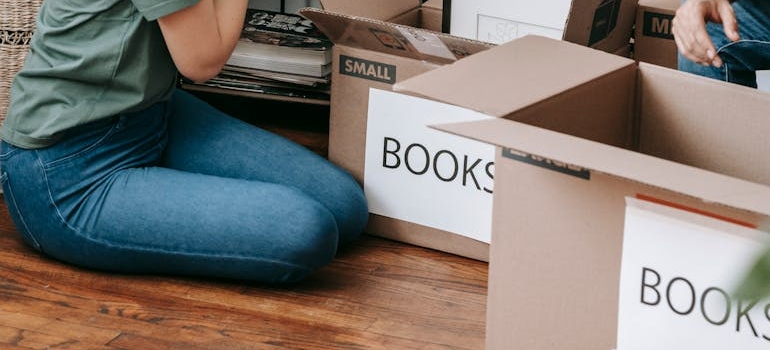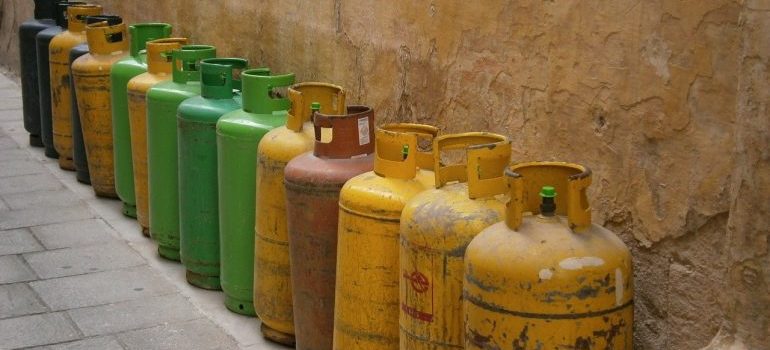Items You Shouldn’t Store in Your Garage
Garages are a convenient storage space for many homeowners. We tend to tuck away items there to save space inside the house or because we assume they’re safe from the elements. However, not everything belongs in the garage. Poor storage decisions can lead to damage, safety hazards, and lost belongings. This Peasley Moving & Storage article will explore items you shouldn’t store in your garage and explain why some of them are better off in more controlled environments.
Risks of Improper Storage in Your Garage
Improper storage in your garage can lead to a range of risks that impact both the items themselves and your home environment. Temperature fluctuations, high humidity levels, and exposure to pests can cause significant damage to various belongings. Items that aren’t stored in proper conditions can degrade more quickly, lose their value, or become hazardous. These risks include:
- Damage from temperature changes: Extreme heat or cold can warp, crack, or destroy sensitive materials like wood, metal, and electronics.
- Moisture and humidity issues: High moisture levels can lead to mold growth, rusting, and corrosion of metal components while making some items unusable.
- Pest infestations: Rodents, insects, and other pests are attracted to items like paper products, food, and fabrics, which can lead to contamination and damage.
- Safety hazards: Storing flammable items like gasoline or batteries improperly can pose a fire or explosion risk, endangering both your property and your family.
Understanding the risks of improper storage and recognizing which items need special care can help you avoid costly mistakes and potential hazards. It’s essential to store your belongings in suitable conditions to protect them from damage and ensure their longevity. When in doubt, consider using climate-controlled spaces or consulting professional services like movers and storage specialists to handle your items correctly.

1. Items Sensitive to Temperature Fluctuations
Storing items in the garage may seem convenient, but the lack of climate control can be a significant issue for many belongings. Temperature-sensitive items can suffer serious damage from the extreme heat in summer or the cold during winter.
Electronics
Storing electronics in the garage is a common mistake. Televisions, computers, and gaming consoles are sensitive to extreme temperatures. Heat and humidity can cause damage to internal components while freezing temperatures can affect screens and batteries. If you’re preparing for a move and considering the best way to handle your electronics, using proper moving boxes in Boise is crucial. Packing these items securely and keeping them in a climate-controlled area until the moving day is a much better solution.
Vinyl Records and CDs
Vinyl records and CDs might seem durable, but they’re highly susceptible to warping in heat or cracking in the cold. Keeping them in a garage that lacks temperature control can ruin your collection. It’s best to store these items inside your home, where the temperature and humidity levels remain relatively constant.
2. Wooden Furniture
Wood is a natural material that reacts to moisture and temperature changes. Storing wooden furniture in your garage can cause it to expand, contract, warp, or even develop mold in damp conditions. For those who need to temporarily store or move furniture, it’s wise to consider professional help like furniture installation services. These services ensure that your valuable pieces are handled with care and are kept in optimal conditions during transportation and storage, protecting them from damage.
Antiques, especially wooden ones, require even more careful handling. The conditions in a typical garage are far too unstable to safely preserve these valuable items. Antiques are best stored in a controlled environment to maintain their integrity and value.
3. Household Chemicals
Many common chemicals, like paints, solvents, and cleaning supplies, are sensitive to extreme temperatures and can become volatile in uncontrolled environments. Exposure to heat, cold, or humidity can alter their composition, potentially making them unsafe or less effective. To avoid hazardous situations and preserve the quality of these products, it’s important to understand why household chemicals need to be stored with care.
Paints and Solvents
Solvents and paint are items you shouldn’t store in your garage because storing paint can significantly reduce its shelf life. Extreme temperatures can cause paint to separate, spoil, or even explode in certain conditions. If you must keep paint, find a spot inside the house where the temperature is more stable.
Cleaning Supplies
Household cleaners often contain chemicals that can become volatile under the right (or wrong) conditions. Heat and cold can cause these chemicals to change their composition, potentially creating hazardous fumes or causing leaks. For a safer and more convenient alternative, consider relocating your chemicals to a storage area specifically designed to handle hazardous materials.

4. Paper Products
Paper products might seem harmless to store in your garage, but they are highly susceptible to damage from moisture, pests, and temperature changes. Without the right conditions, important documents, books, and other paper items can quickly deteriorate or become a target for rodents and insects.
Important Documents
Many people think a box in the garage is a great place for old files, tax records, or family photos. However, paper is highly susceptible to damage from moisture, insects, and rodents. Your essential documents could end up ruined or lost if not stored correctly. It’s best to keep these in airtight containers inside the house or, if you’re packing for a move, use specialized packing supplies in Boise that can provide adequate protection against these elements.
Books and Magazines
Books and magazines can quickly deteriorate in the garage due to humidity and pests. Mold and mildew thrive in these conditions, which can cause permanent damage to paper. Insects and rodents are also naturally drawn to these materials, attracted by the cellulose in the paper. To ensure the longevity and preservation of your reading material, it’s best to store books and magazines in a dry, climate-controlled area inside your home.
5. Food Items
Garages are prone to temperature swings and high humidity, which can compromise the quality of food products and attract unwanted pests. Even non-perishable items like pet food and bird seed can become a target for rodents and insects.
Pet Food and Bird Seed
Many people store pet food or bird seed for easy access although they are items you shouldn’t store in your garage. Unfortunately, these items attract pests like mice, rats, and insects. Once these pests find your food supply, they can become a significant problem, not just in the garage but throughout your home.
Canned Goods
Canned goods have a longer shelf life than most foods, but they shouldn’t be stored in fluctuating temperatures. The expansion and contraction caused by heat and cold can compromise the seal on the cans, leading to spoilage. If you’re moving to Idaho, it’s essential to think ahead about how to store food supplies properly. Idaho’s climate can vary greatly, so keeping temperature-sensitive items in appropriate storage is critical.
6. Clothing and Fabrics
While it might seem like a good idea to store off-season clothing, bedding, or linens in your garage, these items are at high risk for damage when exposed to the elements. For the sake of protecting your garments and linens from these threats, it’s best to store them within your home where they are safe from environmental hazards.
Seasonal Clothes
Storing clothing in your garage may seem like a practical solution, especially for items you only use during specific seasons. However, fluctuating temperatures and humidity can cause fabrics to degrade, and pests can easily chew through them. It’s a better idea to use vacuum-sealed bags or airtight containers, stored in a closet or attic space where the environment is more controlled.
Bedding and Linens
Bedding and linens are also items you shouldn’t store in your garage as they attract pests like moths and rodents. To keep these items fresh and intact, store them in plastic containers that are kept inside the house.

7. Gasoline and Propane Tanks
Gasoline and propane tanks are highly flammable and pose a serious safety risk when stored improperly. Garages often lack the necessary ventilation and temperature control to handle these volatile substances safely. Hence, it’s hazardous to store gasoline and propane tanks in the garage.
Even small temperature changes can cause these substances to expand, potentially leading to leaks or explosions. Always store flammable items in a well-ventilated area away from your home or a dedicated outdoor storage shed. For those handling these items during a move, make sure to inform the moving company about any potentially hazardous materials to avoid accidents.
8. Artwork and Photographs
Art pieces, whether framed or canvas-based, are particularly vulnerable to environmental changes. Heat and humidity can cause the paint to crack or warp the canvas, while cold temperatures can make the material brittle. Old photographs are best stored in albums or boxes that offer some level of protection against moisture and light. Placing these items in the garage can lead to discoloration and fading due to temperature fluctuations.
9. Musical Instruments
Musical instruments are delicate and require specific care to maintain their sound quality and structural integrity. Garages, with their fluctuating temperatures and humidity levels, can cause severe damage to instruments like pianos, guitars, and violins. Wood can warp, metal strings can rust, and the overall tuning can be affected by these conditions.
Pianos are incredibly sensitive to changes in temperature and humidity. Given their value, it’s crucial to find the right storage solution for these instruments. For those relocating or rearranging their homes, relying on piano movers in Boise can make the process much smoother. Professional movers ensure that pianos are transported safely and stored in conditions that preserve their quality.
Like pianos, other string instruments need stable conditions to maintain their structure and sound. Heat can cause the wood to dry out and crack, while cold and moisture can lead to swelling and warping.
10. Batteries and Power Tools
Batteries, especially lithium-ion types, can be affected by extreme heat and cold. The garage’s fluctuating temperatures can lead to reduced battery life or even cause it to leak, creating a potential fire hazard. While power tools are often stored in garages, it’s crucial to protect them from moisture. Rust can form on the metal parts, reducing their effectiveness and potentially making them dangerous to use.

11. Tires
Storing tires in the garage may seem like the most logical choice, but unless they’re properly maintained, they can degrade faster than expected. Tires are affected by temperature changes, which can cause them to crack or dry out, especially in cold conditions. To prolong their lifespan, store tires in a cool, dry place and keep them off the concrete floor to prevent moisture absorption.
12. Collectibles and Valuables
If you have a collection of comic books or trading cards, the garage is not the place for them. Heat, humidity, and pests can destroy the condition of these collectibles, significantly reducing their value. Jewelry and other heirlooms should never be stored in a garage. These items need a secure, climate-controlled environment to prevent tarnishing, damage, or loss. For peace of mind, consider storing such valuables in a safe inside your home or in a safety deposit box.
13. Appliances That Aren’t in Use
While many people keep old refrigerators or freezers in their garages, it’s important to be aware of their energy inefficiency in non-climate-controlled spaces. These appliances have to work harder to maintain their temperatures in extreme conditions, which can drive up your energy bills. For a more efficient alternative, use these appliances only in climate-controlled areas or unplug them if they’re not in active use.
Simple Steps for a More Secure Home
Organizing your garage with a focus on what truly belongs there can transform it into a functional and safe space. Simply by keeping hazardous or sensitive items elsewhere, you can protect your belongings and create a more orderly environment. After all, knowing which items you shouldn’t store in your garage helps prevent damage and keeps your valuables in better shape. Thoughtful storage choices can make a big difference, helping your garage serve as a reliable spot for the items that need it most. Ultimately, embracing these tips can lead to a cleaner, more efficient space that works in harmony with your home.

Everyone from the packers to the movers were awesome! They were all very professional and showed up when they were supposed to. would definitely use them again.

